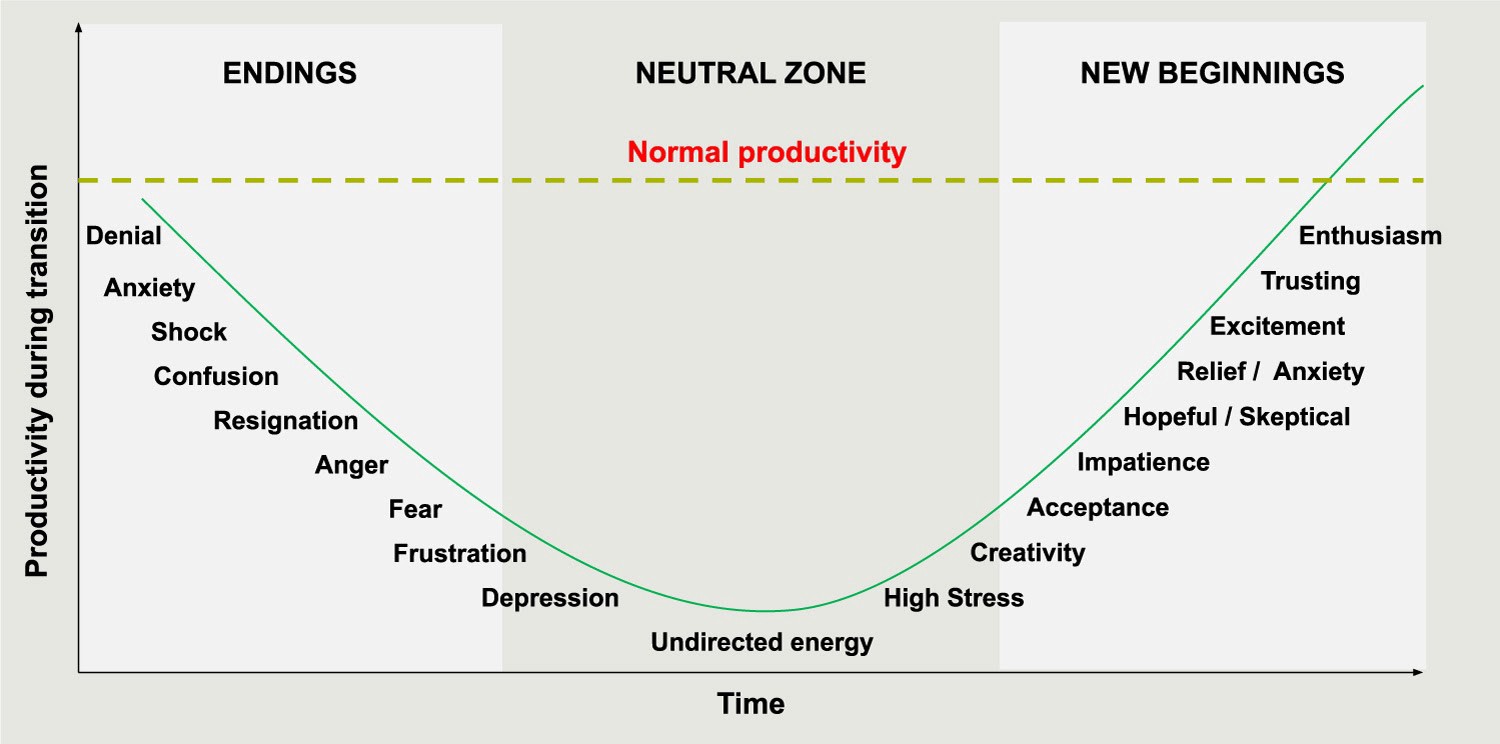
"To improve is to change; to be perfect is to change often."
― Winston Churchill
We deal with change all of the time, but 2020 has thrown more change than usual at us. From the COVID-19 pandemic and the rapid shift to remote teaching, learning and working, to the monumental transformation that our university is undertaking, the U of A community is living in an unprecedented time of change - and that degree of change is accompanied by stress for everyone. As a change management specialist, these are the moments when I look to change management theory to understand and contextualize our collective experiences, and to explore resilience amid change. I want to share just a bit of that perspective here.

The change curve is a tool I almost always share during workshops and presentations on change. Developed by Elizabeth Kübler-Ross (of stages of grief fame) in the late 1960s, it has been adapted through the years - William Bridges developed the model pictured here in 1991. When I ask workshop participants to point out where they see themselves on the curve, I often get a wide range of answers. This is certainly true of the U of A at this moment. Everyone goes through the process of change at their own pace.
Changing requires us to let go of the old - the endings stage - and this process can be accompanied by shock and denial, anger, blame, grief, confusion, and even depression. Between the old and the new sits a stage characterized by undirected energy: the neutral zone. Even as new beginnings emerge, it's common to feel impatient, even anxious, alongside more positive emotions. One of the important features I work to point out is that much of this curve exists below a normal productivity level - that, too, is a common experience for people going through change. As we navigate the many changes presently facing our U of A community, I invite you to take a moment and reflect: where do you see yourself on the curve right now? There's no wrong answer.
Resilience is a prevalent theme during major changes and transitions, like the ones we're currently moving through at the U of A. Resilience is the process of adapting well in the face of adversity, trauma, tragedy, threats, and other significant sources of stress. Although some people may seem more naturally resilient than others, change management theory suggests that we can all improve our resilience over time. Making realistic plans, communicating clearly and often, and working on effective problem solving are three ways that we can build up our resilience during change.
Of course, as a change specialist, I can't reiterate this point often enough: change is hard. It is very common to want to resist change and maintain the status quo. Many factors contribute to the resistance of change: too much or too little information, overwhelming emotional responses (often fear of the unknown), and a deficit of trust, are a few of the possible factors that contribute to resistance.
Resistance is as much a part of any process of change as resilience. So, I want to finish with three simple but effective practices that I encourage in my workshops and sessions to help people working through resistance and working on resilience:
- Actively seek out information and ask questions. Doing this can help us feel more in control of the situation and helps to build our resilience.
- Think and/or talk through overwhelming information with other people. A strong network of supportive friends, family and colleagues that you can talk to can help in times of change. Don't be afraid to ask for help when you need it, or to offer help when you see an opportunity.
- Create time and space for emotional reactions, and give them time and space to subside. As I mentioned above: we all move through the change curve at our own pace. It's okay to give ourselves permission to work through the emotions that accompany it.
Perseverance is key, but remember to be kind to yourself as well - and to use the resources we have at our disposal within the U of A community (links below). Remember that it takes time to build resilience.
Megan McDougaldMegan McDougald is a strategic and transformational change manager currently working on the U of A's Service Excellence Transformation initiative. A member of Human Resource Services, Megan has also served as a senior consultant on transformational change and strategy, organizational development, excellence, and health. She has her PhD in Business from the University of Alberta, specializing in Strategic Management and Organizations, as well as certification in Change Management from APMG International.
Additional Resources at the U of A
Faculty and Staff Health and Wellbeing and Mental Health Resources (U of A) You can sign up for their newsletter here.
Personal Sides of Change and Transition: The 'Me' in Change, & Tips for Supporting Self and Others (Sessions available through the U of A LearnCentre)
Employee Family Assistance Program (EFAP)
EFAP online courses, such as Resilience & Embracing Workplace Change
COVID-19 Mental Health Resources for Students (U of A)
WellTrack (in partnership with the U of A)
Mental Health Check-in (U of A)
PositiveU (U of A)